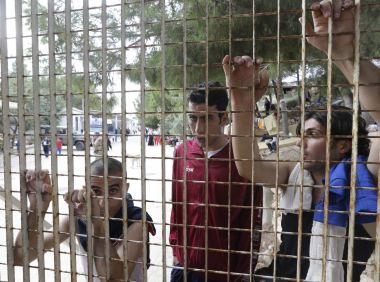Number of migrants drowning in the Mediterranean has doubled, church calls on EU to act
Church leaders and charities have called on the European Union to do more for migrants in the central Mediterranean area.

The appeal comes in the wake of figures showing that more than 3,000 migrants had died crossing the Mediterranean this year. The death toll, with nearly three months to go before the end of the year, is already more than double the previous worst year in 2011 and more than four times the death toll of last year, when 300 migrants drowned within sight of the Italian island of Lampedusa. Europe is now the most dangerous destination for 'irregular' migrants, according to the International Organization for Migration.
As European justice and home affairs ministers met in Luxembourg, Human Rights Watch and Amnesty International issued a statement saying that there should be a "comprehensive and collective" European Union response to the crisis. Amnesty spokesman Nicolas J Beger said: "As the EU builds its walls higher and higher, migrants and refugees are increasingly taking to the Mediterranean waters in a desperate bid to reach safety and sanctuary in Europe. Tragically they are increasingly paying the highest cost, losing their lives at sea."
Almost half of the 165,000 migrants to have arrived in Europe across the Mediterranean are from Eritrea and war-torn Syria. Italy is the only EU country to have responded to the need to protect them, with Operation Mare Nostrum, deploying a significant part of its navy for search-and-rescue operations; it has saved an estimated 113,000 migrants so far this year, most of whom leave Italy for other European destinations.
The general secretary of the Churches' Commission for Migrants in Europe (CCME), Doris Peschke, said: "Facing these challenges requires renewed commitment to share the responsibility to protect and to ensure legal and secure access to Europe for those in need of protection."
CCME called for the temporary lifting of visa requirements for Syrian and Iraqi refugees and for an increase in provision for emergency resettlement from neighbouring countries. Peschke praised the Mediterranean Hope initiative of the Federation of Protestant Churches in Italy, saying: "We are encouraged by so many initiatives and actions undertaken in our membership. We would hope that this spirit of sharing and supporting can be taken forward in political decisions to share the responsibility to protect."
She added: "As Italy and the Southern European countries, potentially also the Eastern EU member states, carry the brunt of arrivals, and only few EU member states, including Sweden and Germany, have received the highest numbers so far, it appears of utmost importance to share the responsibility for the protection of refugees among EU member states in a better way."
According to UNHCR, 86 per cent of the world's refugees are hosted by developing countries. In 2013 Germany received most claims for asylum at 109,600, with the US second at 84,400. The UK received only 23,507 new applications for asylum by the end of 2013.











